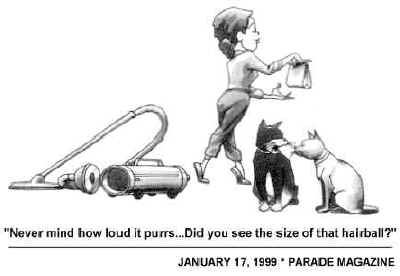Please Help Pets by Donating One Dollar
Hairballs can jeopardize your Cat's Health
By: Dr. Jane Bicks
Cats spend up to 1/3 of their waking hours self-grooming. The tiny barbs on
a cat's tongue pull loose hair from it's coat and those hairs are swallowed.
Because hair is very difficult to digest, it compacts with undigested food in
the intestines.
The accumulation becomes a source of irritation if it is not eliminated in
the litter box or coughed up. The result is messy fur-like, cigar-shaped forms
on the floor or furniture. Some surgically removed hairballs are almost 3
inches in diameter.
Although you may not see hairballs, there may be a significant accumulation
in your cat's stomach and intestines!
Signs of hairball problems:
* Fur-like, cigar-shaped clumps of fur on floor or furniture.
* Dry, hacking cough.
* Vomiting after meals.
* Preoccupation with eating plants or grass.
* Hair entwined with the feces.
* Dry dull coat and/or excessive shedding.
* Poor appetite and/or weight loss.
* Constipation or diarrhea.
Common Treatments: * Single focus products do not address a cat's entire
system. * Mineral oil or petroleum lubricants are petrochemical products *
Large amount of fiber can decrease intestinal absorption of nutrients and may
result in malnourished animal * Enemas for constipation requires
tranquilization and can be dangerous.
What you can do about hairballs:
I suggest you give my Gourmet Cat Treats a
try if your kitty is
prone to hairballs
Try Gourmet Cat Treats for Hairball Management Here
